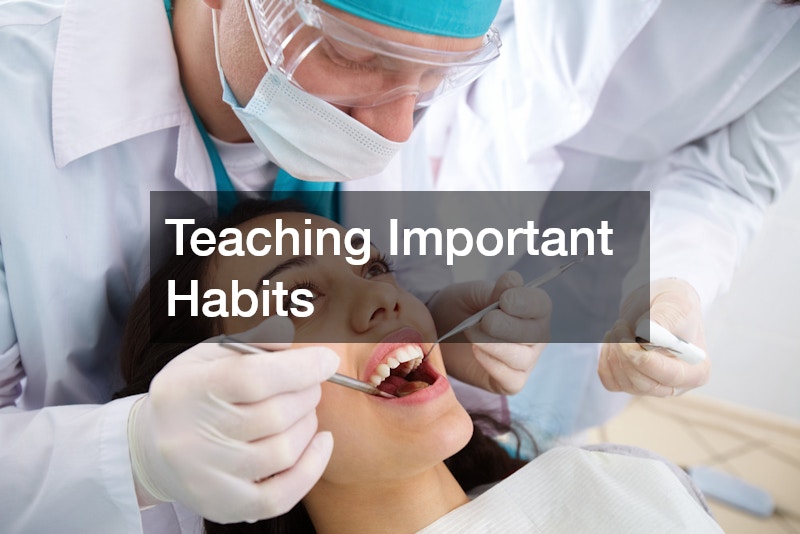Dental health is a crucial component of overall well-being that is often overlooked. While many people associate dental care with maintaining a bright smile, its significance extends far beyond aesthetics. Poor dental health can lead to a range of problems that affect other areas of the body, highlighting the interconnected nature of health in general. Understanding this relationship is vital to appreciating the full impact of oral hygiene practices and dental interventions.
Regular visits to a dental office not only help prevent tooth decay and gum disease but also contribute to the early detection of systemic conditions. Consistent dental check-ups can reveal early signs of diseases such as diabetes, cardiovascular issues, and even certain cancers. Awareness and prompt action in response to these signs can dramatically improve health outcomes.
Moreover, the habits developed through diligent dental care are indicative of broader health practices. The responsibility ingrained in maintaining oral hygiene fosters a proactive approach to personal health. Recognizing the importance of dental health is an essential step in achieving overall well-being and can lead to a change in how we perceive routine health practices.
Teaching Important Habits

Visiting a dental office on a regular basis instills a sense of responsibility towards health care. This routine teaches individuals the importance of keeping up with health check-ups and understanding the requirements of maintaining good health. By consistently attending dental appointments, individuals learn to prioritize their oral health, which often translates to other health-related habits.
The act of scheduling and attending regular dental visits enforces the idea of preventative care. Patients are educated on the benefits of habitual teeth cleaning and the dangers of neglecting oral hygiene. This educational aspect of dental visits is essential in teaching individuals to be proactive rather than reactive regarding their health needs.
Developing these habits from an early age sets a foundation for lifelong health consciousness. Parents who take their children to a family dentist provide them with early exposure to the significance of health care. Starting young helps inculcate a mindset that values regular health maintenance, which is beneficial for long-term wellness.
Treating Intense Pain
An emergency dental visit can often be the result of unexpected and intense oral pain. Promptly addressing dental pain not only relieves discomfort but also has profound effects on overall wellness. Pain can lead to a decrease in quality of life, affecting sleep, mood, and the ability to perform daily tasks.
Relieving dental pain through appropriate interventions allows individuals to return to their normal routines with renewed vigor. The impact of pain management on mental health can be significant, as chronic pain is often linked to depression and anxiety. Addressing these concerns through dental care can thus enhance both mental and physical health.
Moreover, treating dental issues that cause pain can prevent further health complications. For instance, untreated infections in the mouth can spread and cause systemic issues. Emergency dental care ensures that such problems are identified and treated before they escalate, promoting overall health and well-being.
Establishing Good Routines
Routine teeth cleaning offers more than just a gleaming smile; it is a fundamental practice in establishing lifelong healthy routines. Consistently adhering to dental cleanings can reinforce the importance of routine health maintenance. This consistent practice encourages individuals to adopt similar habits for other aspects of their health.
The process of regular teeth cleaning educates patients on the importance of somewhat less visible health practices. This learning extends to understanding the benefits of flossing, choosing the right dental products, and making dietary choices that support oral health. Such knowledge is empowering and enhances overall health literacy.
Beyond its educational value, routine teeth cleaning is critical in preventing serious dental issues. The removal of tartar and plaque decreases the risk of gum disease and tooth decay. These preventive measures not only spare individuals from the pain and cost of corrective treatments but also support the general health of the body.
Pursuing Health Needs

Choosing to receive a dental implant when necessary represents a proactive approach to maintaining overall well-being. Dental implants not only restore oral functionality but also significantly improve one’s quality of life. Restorative dental procedures highlight the importance of addressing health needs promptly and effectively.
The decision to receive a dental implant is a reflection of valuing one’s health and appearance. It demonstrates an understanding of how oral health impacts the ability to eat, speak, and smile comfortably. These capabilities are essential for social interactions and self-esteem, thus contributing to overall emotional and psychological wellness.
Affordability is often a concern for those considering dental implants. Finding affordable dental implants can alleviate financial stress while still meeting health needs. Balancing cost with health priorities underscores the importance of pursuing wellness goals in a sustainable manner, further enhancing overall wellness.
Adjusting Structural Imbalances
Braces are a common solution for correcting structural imbalances in the mouth, offering both cosmetic and health benefits. By aligning teeth properly, braces improve bite function, which aids digestion and reduces oral strain. Better alignment consequently supports broader physical health.
While some may seek braces for cosmetic reasons, the health advantages are equally significant. Properly aligned teeth are easier to clean and maintain, leading to lower risks of tooth decay and gum disease. This structural improvement results in better oral and systemic health.
Today, options such as clear braces make dental care accessible to more people, catering to aesthetic preferences while addressing medical needs. The ability to choose from different types of braces enables individuals to tailor their dental treatments to fit their unique requirements. Such customization enhances the overall wellness experience by simultaneously addressing health needs and personal preferences.
Increasing Self-Advocacy
Visiting local dentists presents an opportunity to develop self-advocacy skills, a vital component of achieving overall wellness. Self-advocacy involves understanding one’s health needs and communicating them effectively with healthcare professionals. Engaging actively in dental care decisions builds confidence in managing other health aspects.
During dental appointments, individuals learn to ask questions about their treatment plans, preventive strategies, and oral hygiene practices. These interactions foster a sense of empowerment, encouraging patients to take charge of their health. As a result, they are more likely to engage proactively with other healthcare providers as well.
Moreover, establishing a relationship with local dentists fosters familiarity and comfort in communicating health concerns. When individuals feel confident discussing their needs, they are more likely to seek appropriate care and interventions. This proactive approach nurtures a sense of autonomy, enhancing overall well-being.
Starting Young

Taking children to a family dentist from a young age helps instill the importance of health and wellness early on. Frequent dental visits promote an understanding of hygiene and personal health responsibility. Introducing children to these concepts early encourages lifelong healthy habits.
A family dentist provides a welcoming environment where children feel comfortable and safe. The formation of positive dental experiences discourages fear or anxiety related to dental care. Preventing dental anxiety fosters a more positive attitude towards health maintenance in general.
Early dental visits serve as foundations for educating children about the effects of sugar, the importance of brushing and flossing, and the value of regular check-ups. Such education empowers children to make informed decisions about their health from a place of understanding rather than obligation.
Improving Financial Awareness
Exploring options for affordable dental implants illustrates the intersection of health and financial literacy. Dental procedures can be costly, and understanding how to finance them responsibly is an element of overall wellness. Finding cost-effective solutions mitigates potential financial stress while maintaining health priorities.
Cost considerations push individuals to research and evaluate their options, promoting informed decision-making. Discussing financial considerations with a dentist in a dental office emphasizes the value of being resourceful and strategic about health investments. This approach fosters a balance between financial stability and medical well-being.
Affordability in dental care services enables more people to access necessary treatments without compromising their financial health. The ability to manage health expenses wisely is a critical aspect of general wellness. Learning the skills needed to navigate healthcare expenses provides long-term benefits beyond oral health, enhancing overall quality of life.
Catering to Individual Needs
Clear braces offer a unique opportunity to address dental needs while catering to individual tastes and preferences. These braces provide the necessary structural support for aligning teeth while allowing patients to maintain their desired aesthetic. Their discreet nature appeals to those who prefer subtlety in dental treatment.
Catering to individual preferences increases a patient’s satisfaction with the process, improving their commitment to treatment. Positive experiences during dental treatments often translate into a more consistent approach to health management. When patients feel their needs and desires are acknowledged, their engagement with their health is more genuine and proactive.
The availability of clear braces is indicative of evolving dental technologies aimed at enhancing patient experiences. Personalized dental care not only addresses immediate health concerns but also respects patients’ lifestyle choices. This respect and understanding for individual needs improve patient-provider relationships and encourage holistic health practices.
Balancing Gut Health

General dentistry plays a vital role in balancing gut health, an essential component of overall wellness. Oral health and gut health are interconnected, as the mouth is the entry point to the digestive system. Practicing good oral hygiene reduces harmful bacteria that can negatively affect digestion.
Harmful bacteria originating in the mouth can upset the gut’s natural balance, leading to issues such as inflammation and discomfort. General dentistry practices, including regular cleanings and check-ups, help manage these bacteria levels, promoting healthier digestion and systemic health. This relationship demonstrates the importance of maintaining oral hygiene as a broader health strategy.
Beyond digestion, the oral-gut connection influences nutritional absorption and overall health. Proper oral hygiene ensures that nutrients from food are effectively absorbed, supporting various body systems. Recognizing the connection between oral practices and gut health inspires a comprehensive approach to wellness, acknowledging the body’s interconnected nature.
Dental health is a crucial facet of overall wellness that influences various aspects of life. From fostering important habits and addressing pain to adapting treatments to individual needs, oral care is imperative for holistic health. Embracing regular dental visits, understanding financial wellness, and nurturing early health habits lay the foundation for a healthier future. Oral health is a gateway to profound physical, mental, and emotional well-being, underpinning the necessity of recognizing its impact on overall health.



